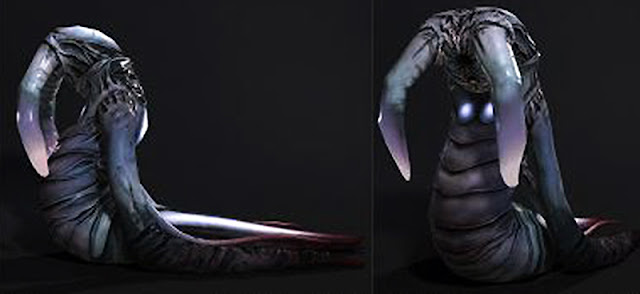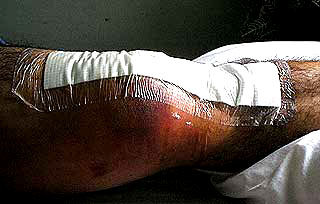 |
| Fanciful depiction of the A Bao A Qu found on the internet |
IN APRIL 1993 I received a strange request in the post. John Hagedorn - an American educationist-cum- percussionist then based in Alexandria, Egypt - wrote asking me to research the Malayan origins of the legend of "A Bao A Qu." Hagedorn's travel-writer colleague, Christopher Green, had unearthed this obscure tale from Jorge Luis Borges's 1967 Book of Imaginary Beings.
Borges claimed he had found the "A Bao A Qu" story in the appendix of C.C. Iturvuru's 1937 treatise, On Malay Witchcraft. I finally tracked down Borges's version of the "A Bao A Qu" story in the University of Malaya library - so I can vouch for the reliability of Green's succinct summary of this hoary tale:
To see the most lovely landscape in the world, a traveler must climb the Tower of Victory in Chitor
 |
| King Kumbhakaran aka Rana Kumbha |
A winding staircase gives access to the circular terrace on top, but only those who do not believe in the legend dare climb the tower.
On the stairway there has lived since the beginning of time a being sensitive to the many shades of the human soul known as A Bao A Qu. It sleeps until the approach of a traveler and some secret life within it begins to glow and its translucent body begins to stir.
As the traveler climbs the stairs, the being regains consciousness and follows at the traveler's heels, becoming more intense in bluish color and coming closer to perfection. But it achieves its ultimate form only at the topmost step, and only when the traveler is one who has already attained Nirvana, whose acts cast no shadows.
Otherwise, the being hesitates at the final step and suffers at its inability to achieve perfection
["Its moan is a barely audible sound, something like the rustling of silk."]
It tumbles to the first step as the traveler climbs down and collapses weary and shapeless, awaiting the approach of the next traveler.
In the course of the centuries, A Bao A Qu has reached the terrace only once.
For some reason I felt sure that C.C. Iturvuru (what an amazing name!) had heard the tale from an Orang Asli. The first person I asked happened to be Seri Pagi (though I only knew him as Pak Diap then). I gave him a simplified rendering of the A Bao A Qu legend and waited while the rusty gears of his memory whirred. His brow furrowed and then he broke into a broad grin, exclaiming in triumph: "Abang Aku! You mean Abang Aku!"
But of course. The way Orang Asli slur their vowels (especially in the states of Negri Sembilan and Pahang), Iturvuru might well have heard it as "A Bao A Qu." My Elder Brother, Abang Aku.*
I felt a jolt of electrifying knowledge. Diap said he remembered hearing a story similar to that when he was very young. It involved a spiral stairway connecting one dimension to another. A stairway once used by visiting or incarnating stargods. They say some got caught out by the calamitous closing of the interdimensional pathways. Once brilliant stars in their own universe, they fell to Earth and became ensnared in Time. Some of them ended up just like poor Abang Aku alias A Bao A Qu. A spirit fragment of cosmos caught in the gravity of human karma; a glorious starbeing lying inert at the bottom of the stairway to heaven, dependent on messy human destiny for its own fulfilment.
Only one other Elder seemed to have heard of Abang Aku. Village shaman Sudin Aus kept nodding sagely when I outlined the A Bao A Qu story to him. Then he smiled and said, “My Elder Brother is a reference to the Orang Asli. Our spirit will not be free until the younger races achieve nobility of purpose and purity of heart.”
Almost everyone, however, was familiar with the cryptic image of the long and winding stairway to the most wonderful view on Earth.
THE A BAO A QU MYTH evoked images of chakras - energy spirals operating on macro and micro levels - primordial forces attaining self-awareness, and nebulous notions of some deep alchemical mystery - an H.P. Lovecraftian vision of the strange, chthonic thoughtfields from which our familiar symbols sprout.
“Abang Aku” brought to mind the Great Old Ones, ancient squid-like beings central to Lovecraft’s Chthulu tales. (It also brought to mind Gurdjieff's Kundabuffer. This peculiar word was coined in the 1920s by the Greek-Russian magician-philosopher, G.I. Gurdjieff, to explain some "tragic flaw" in Man's genetic programme which condemns him to futile lifetimes of Sisyphean** struggle, forever slipping back into robotic animality just when he's on the threshold of illumination.
Some believe that this "Kundabuffer Effect" was deliberately installed by a somewhat insecure Creator God (or gods), to retard the evolution of human intelligence and thereby perpetuate a harnessable labour force on Earth. The Tower of Babel story lends credence to this notion of an "Almighty Father-God" who, feeling threatened by his mortal creatures' overweening ambitions, confounds them with a babble of tongues. Another scenario describes how humanity had its original 12-strand DNA reduced to two, to confine our consciousness within the physical world.)
I sensed that the A Bao A Qu story offered a key insight into the magical teachings of the Ancients. At some remote point in the infinite spiral of existence, an aspect of Spirit found itself trapped in a Promethean*** nightmare loop of recurring time. Only a self-realized and karma-free human could release the A Bao A Qu from its eternal yearning for perfection.
 |
| Tower of Victory in Chittorgarh, Rajasthan, India |
Chita or cita is closely related to cinta, romantic love - desire, emotions, feelings, longing, love, aspiration. (It could also, by invoking homophonic licence, be a slurring of cherita - nowadays spelled cerita - which means "story.") In effect one might describe chita as a poetic symbol for the Imagination, the Desiring Mind. But this is assuming it is related to Chitor, the town named in the legend of A Bao A Qu. And I assume it is, because myth is meant to be a malleable, dreamlike substance.
The test of myth-entering keys lies in their emotive resonance when struck. Substituting “Abang Aku” for “A Bao A Qu,” “Chita” and “cerita” for “Chitor,” and “you” for “the traveler” - what do we get? A metaphysical conundrum that echoes in some barely remembered attic of our unconscious. A vague feeling of déjà vu, of “When did I dream this dream?”
Was I the intrepid traveler, the hero, the messiah, redeemer of gooey amorphous geeks? Or was I Abang Aku himself, waiting eon upon eon for humanity to attain Buddha and Christ consciousness? Who else would have “already attained Nirvana,” whose acts would “cast no shadows” - in other words, be completely free of karmic consequences. And who might this Exalted Being be - if not our own Noblest Aspect, the Omega point of our Adamic Alpha?
That's why Abang Aku reaches perfection only once. However, his dream body or holoform remains embedded in the mythic realm as a timely trigger, to awaken anyone who chances upon the legend to the nature of his or her true purpose on this Earth.
______________
* A. Ghani Ismail, an ardent scholar of Malay esoteric lore, offers some information which sheds a whole different light on the A Bao A Qu legend. He suggests that the phrase in question is actually a slurring of “Ibu Aku” (“My Mother”), explaining that in pre-Islamic Malay shamanism, the gateway to other dimensions was via an inner journey through the spiral staircase of the etheric umbilical cord which reconnects us with our pre-birth experience of oneness with the Mother. By voyaging beyond the point of our own conception, we break through the veils of time and space and regain cosmic consciousness. I thought this variation on the theme warranted inclusion, at least as a footnote.
** Sisyphean: from Sisyphus, in Greek mythology a cruel and cunning king of Corinth, who was punished in Hades by being made to roll a heavy boulder up a steep hill. Every time he got to the summit, the boulder would roll back down the hill, and Sisyphus had to repeat the process over and over forever.
*** Promethean: from Prometheus, in Greek mythology a first-generation god (or Titan) of Fire and Intellect, who returned the gift of Fire to Mankind (which Zeus the second-generation Olympian had withheld) - and for that was chained to a rock and his liver devoured by an eagle every day. Every night, the liver would regenerate and Prometheus would come back to life, only to have the eagle eat his liver all over again, and so on, ad infinitum. (It's less gory, but a lot scarier, when you approach this mythic morsel as a giant metaphor for compulsory reincarnation: Prometheus is the Soul, the rock is the physical world, the liver represents a lifetime, and the eagle is the emblem of Higher Authority or Spiritual Law. As a symbol, the eagle is interchangeable with the Indonesian garuda, the Chinese phoenix, the Mexican quetzal, or the Russian firebird, which represents Eternal Return. And Prometheus, the Fire-Bringer, is often identified with Lucifer, the Light-Bringer.) From the 'Management' point of view, Prometheus is a subversive element - but 'Labor' would see him as a cult hero, a freedom fighter, a System-bucking Little Red Robin Hood!
[This essay was originally included as a chapter in my book TANAH TUJUH ~ Close Encounters with the Temuan Mythos, published by Silverfish Books in 2007. First posted 15 October 2022. Reposted 24 October 2025]















































